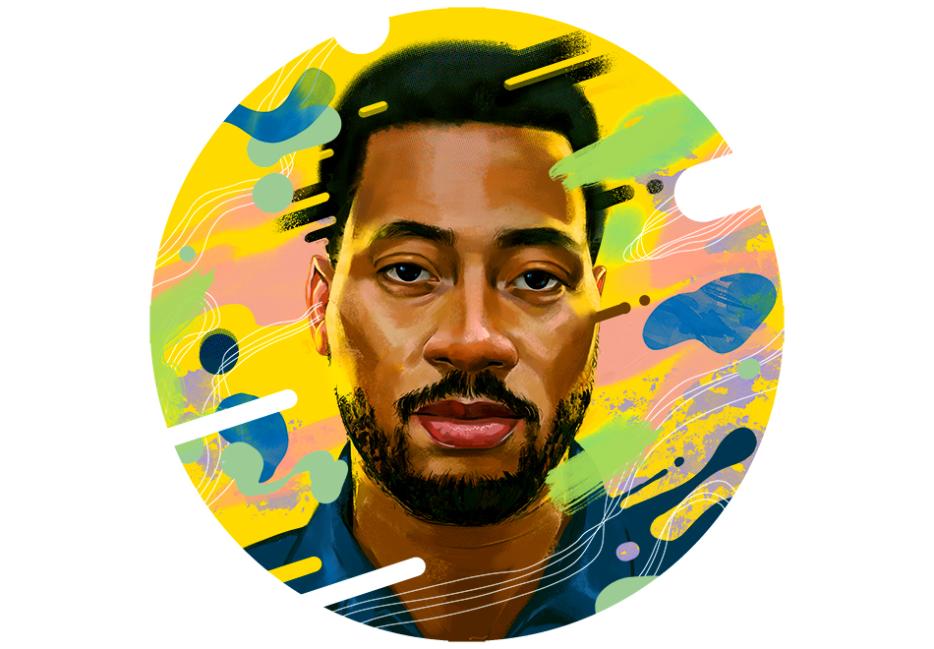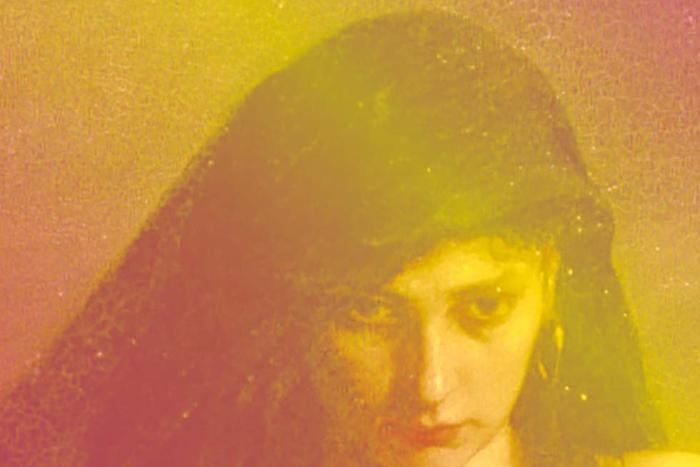Welcome to Mind in Bloom, a column deconstructing current events, music and art.
March 2025, Rolling Loud California. An ocean of glimmering phones paints a horizon, piercing the dark stillness of the Inglewood night. A barely perceptible drone sails through a misting of smoke that hangs limply in the air. The crowd crests expectantly just before a sudden burst of harsh electronic noise rips through the silence, resolving into the opening bars of “Pop Out.” The now-visible stage depicts a post-apocalyptic ghetto landscape. Three muscular Black bodyguards look on silently, recalling Public Enemy’s S1W security team. Two white rockers in punk garb are slam dancing atop separate halves of a bisected pickup truck, surrounded by more pyro than a pro wrestling entrance. It looks like a party in hell.
Straining to see through strobes and plumes of fog, everyone’s eyes and phones are trained on the lanky 29-year-old pacing back and forth on a balcony in what must be an XXXL tall tee, straight from the days of “Lean Wit It, Rock Wit It”, emblazoned with I Am Music on the front. Celebrating the highly anticipated March 14th release of his third studio album Music, Playboi Carti is arguably the hottest artist in rap today. Weighing in at a gargantuan 30 tracks, Music debuted at the top spot on the Billboard 200 with the biggest streaming week for a rap album since Drake’s For All the Dogs in 2023.
Known to his fans as King Vamp, the Opium label founder started as a SoundCloud rapper in Atlanta and successfully wave-hopped his way from Awful Records to A$AP Mob to Kanye West on the path to superstardom. Playboi Carti’s Rolling Loud appearance felt like a coronation of sorts. His festival shows have supplanted those of his forebears, Travis Scott and Ye, as the biggest spectacle in music. With each release, Carti has risen a peg in the hip-hop hierarchy.
Executive produced by Ye, the surprise Christmas Day release of the frenzied Whole Lotta Red in 2020 cemented him as a top-tier artist. With this album, Carti became one of the main progenitors of “rage rap,” a hip-hop subgenre of distorted electro-tinged beats and in-your-face rhymes that merged trap with a punk aesthetic. Carti would watch the vampire classic The Lost Boys on mute with his music playing over it, a notably direct source of the vibe he has cultivated: edgy, dark, gothic trap crossed with the art-damaged catalogue of Rick Owens. Gradually, the actual content of his music has taken a backseat to his expertly-curated image, possibly making Playboi Carti the perfect artist for the social media generation. In the intervening years between releases, his fans have become a legion, trading leaked unreleased tracks like Deadheads sharing live recordings. The dearth of releases has only intensified the anticipation around his every move, with fans carefully examining his sporadic IG fit pics for clues around a new album.
That follow-up has finally arrived in Music and it is a compelling, exciting release. Despite having 30 tracks, it’s a surprisingly brisk listen with most of the songs clocking in at less than three minutes a piece. With frequent interjections from DJ Swamp Izzo, the album is designed to aesthetically mimic the ‘00s mixtapes that Izzo used to host for artists like Young Thug a decade ago. Carti borrows and refines the early trap sound palette he grew up on as a teen in the Atlanta suburbs, sampling songs from the past like “Bend Over” by Rich Kidz on the jubilant carnival bounce of “LIKE WEEZY.” He can be a deceptively clever lyricist at times, like when he jokes about a spurned lover telling him she has OutKast’s “Ms. Jackson goin’ through her brain” on “EVIL J0RDAN.”
There is a uniqueness that surrounds nearly everything that Carti does. We’ve never seen a rapper who dresses like a high fashion vampire before. We’ve never heard a rapper with a beguilingly chameleonic voice like his before; the mere change of inflection from his high-pitched “baby voice” to the deeper, more natural tone he uses on Music is enough to delineate from distinct artistic eras. Atlanta rap has an ever-changing quality to it, constantly shapeshifting to avoid being copied by the mainstream. With each generation, ATL rappers feel further beyond the traditional guardrails of what rapping is supposed to sound like. It’s quaint thinking that people once had trouble understanding Gucci Mane. Future and Young Thug brought the unintelligible to a new level, with the former recently doing away with words completely, as he does on his “verse” full of grunts and noises midway through Music’s charmingly titled track “CHARGE DEM HOES A FEE.”
Language is further reshaped in Carti’s hands on “TOXIC,” when the word “profit” is hypnotically transmogrified into something closer to “perfect.” His delivery is sometimes so garbled that it sounds as if he was stung by a bee and suffered an allergic reaction, leaving him struggling to get through his verses before being stretchered out of the studio. When Playboi repeats a certain word for female genitalia on “LIKE WEEZY,” he blubbers it with extra spit like Sylvester the Cat saying “Sufferin’ succotash.”
Carti’s lyrics sometimes come off as if they are intentionally slanted—on “GOOD CREDIT,” “moving them boulders” simultaneously sounds like “moving them bodies,” and “free throw” doubles as “free throat” on “Crank.” The way he jostles between his high and low voices at breakneck speed on “RATHER LIE” is thrilling. There is a slippery bit of misdirection: I only realized halfway through “JUMPIN” that it was Carti and not Future rapping the opening verse. Carti has a way of keeping you off-balance here that he seems patently aware of. “They wanted this album to be opposite, but I told 'em I'm comin' normal.”
Unfortunately, what Carti raps about is the usual boilerplate trap fodder of sex, drugs, and violence, with no deeper message or pathos to be found. Drugs in particular have pride of place on the album. “Mollies, perkys, I feel so invincible” is the chorus for “DIS 1 GOT IT.” There is a punkish song called “COCAINE NOSE.” He brags about having “pints of fent’ on the floor,” an impossibly grim reference that could have a deleterious impact on his young fanbase.
The youthful impulse to shock us with how toxic he can be lyrically gets in the way of the radical newness of the music itself, such as on the bizarre cacophony of “OPM BABI” where he exclaims, “This ketamine high, it’s not enough.” Throughout the album, his character is that of a doped-up gang leader, something like Dennis Hopper’s eccentric gas-huffing villain from Blue Velvet. It all harkens back to the showy rock theatre of KISS and Alice Cooper, especially in the context of his live show, which is a contrived representation of a protest that is entirely devoid of real-world protests’ meaning and animating energy.
Befitting his nightcrawler aesthetic, elusiveness has also become a key part of Carti’s success. Fans joke about his “mysterious gimmick,” a constructed persona where we’re only privy to his sartorial choices and his music, forcing us to piece together the rest of his life through gossip and whatever we see in the news. Even his age was unconfirmed, until body camera footage from a traffic stop unearthed on Reddit last year showed him reciting his exact birth date to the officer. After the traffic stop, he was arrested for going 133 mph in a 55-mph zone.
But as we learn more about the real Carti, the picture isn’t pretty. His ex-girlfriend and co-parent Iggy Azalea claimed on Twitter that he cheated on her while she was pregnant, which caused the dissolution of their relationship in 2019. Iggy stated during a Twitch stream in January 2025 that she hadn’t heard from Carti in over six months. Carti being a deadbeat dad has been turned into a punchline by fans, who joke about him being so mysterious that even his own son doesn’t know him.
In February 2023, TMZ broke the news that Carti was charged with a felony for allegedly choking his pregnant girlfriend after an argument about a paternity test. Leaked police body camera footage from the incident shows visible red marks on the victim’s neck. His supporters, largely composed of young white men like the fanbases of many other successful Black rap artists, brush off his abusive behaviour online, and so the party rages on with no accountability. The fetishization of problematic Black artists in America by white listeners is a well-documented tradition that goes back at least as far as Alan Lomax interviewing and recording Lead Belly while he was imprisoned for attempted murder at Louisiana State Penitentiary in the 1930s. Carti’s real-world malfeasance adds an authentic edge to his music that has pushed him to the highest reaches of success. Unlike the many high profile hip-hop figures who have fallen from grace due to their misdeeds in recent years, Carti's misconduct shows no signs of slowing down his ascent.
Kendrick Lamar seems to have given Playboi Carti a ringing endorsement by appearing on Music three times. There has been much consternation online and in the press about why Kendrick, the moral vanguard of hip-hop and conscious rap crusader, would want to collaborate with Carti given his rap sheet. But then again, some men can go watch hoops with their friend while knowing he’s a deadbeat dad. Kendrick isn't the first man to keep problematic company, and he insists that he isn’t our saviour to anybody who will listen. But it’s a strange contradiction considering irresponsible fatherhood was a line of attack that he used during his battle with Drake.
Anyone who watches the Rolling Loud stream of Playboi Carti’s performance will be inundated with a constant flow of banner ads from a cavalcade of companies hoping to profit from their proximity to the biggest rapper in the world. They include beer brand Modelo Especial, food delivery app Gopuff, mall clothing chain PacSun, online jewelry retailer GLD, and the festival itself, who likely paid Carti anywhere between $1 million to $1.5 million dollars for his performance.
Just like the aforementioned brands and collaborators, we co-sign Playboi Carti whenever we engage with his work. He’s undeniably talented and fun to listen to, but every stream makes us complicit. On bonus track “2024,” Carti thumbs his nose at the idea that any such controversy might negatively impact his career: “And no, I can’t be canceled ’cause you feel some type way.” It’s as if Carti is our deadbeat friend and we’re choosing to spend time with him, even though we know that we can’t abide by his behaviour behind closed doors.
Sure, the idea that the art that we consume must come from people who share our morals is a relatively new concept. Certainly, the annals of music are filled with talented artists with objectionable lifestyles. And it’s true that this contemporary expectation of moral purity has created an impossibly high standard for the average artist to live up to. But separating the art from the artist has to have its limits. Playboi Carti’s music is where I draw the line.






